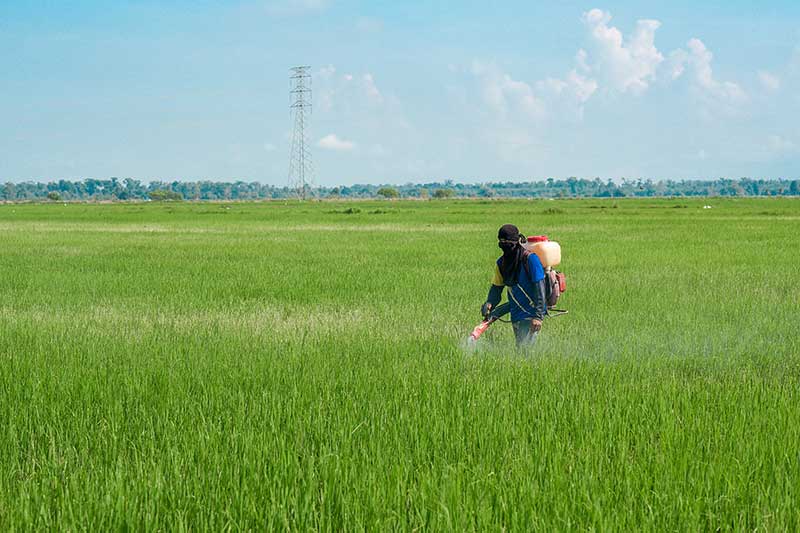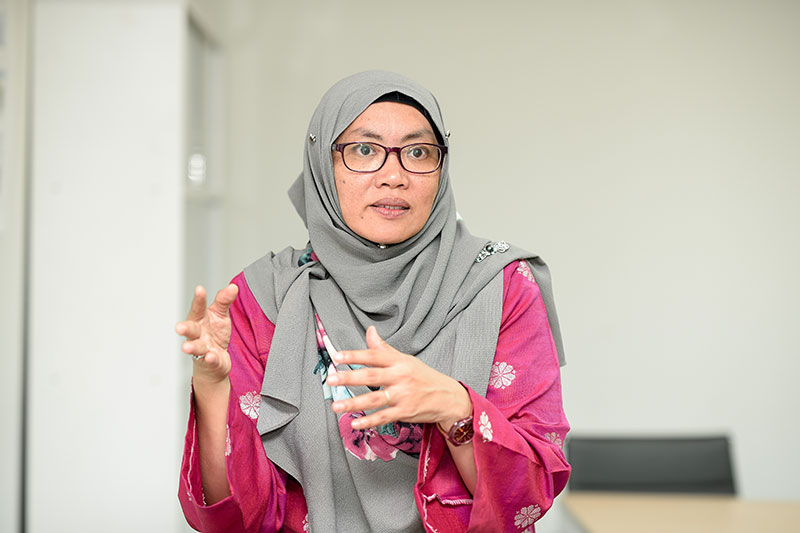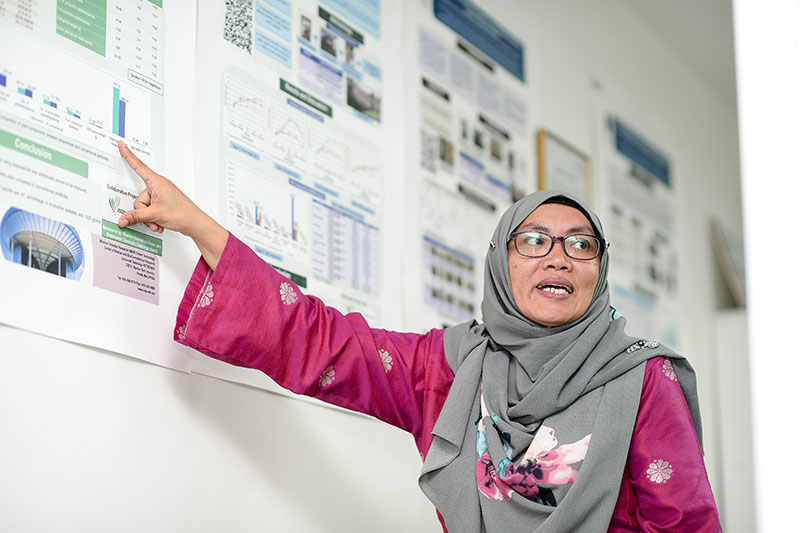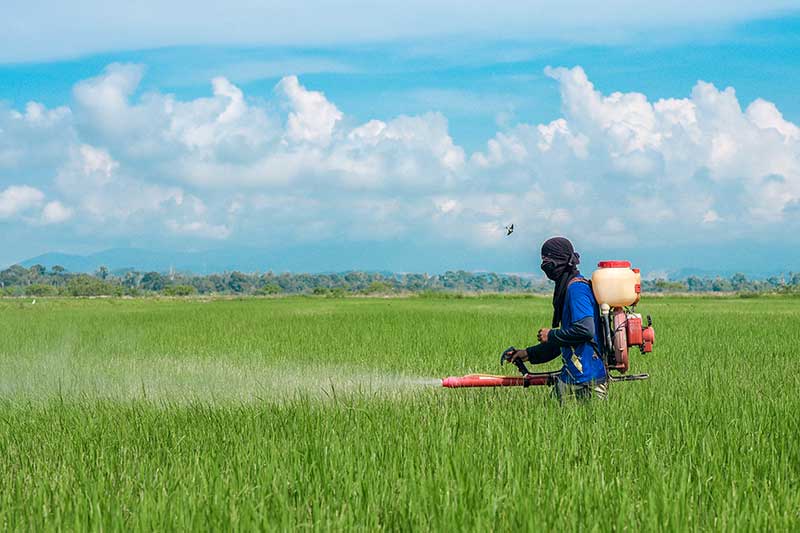Growing Green
[27 May 2018, The STAR]
A yield-boosting biopesticide promises to be a game changer for padi farmers
IT is padi-planting season in Titi Gantong, a small village in Bota, Perak. Brothers Azli Shah, Azman Shah and Azizan have just finished sowing their flooded fields – their work made much easier these days thanks to modern machinery. Gone are the days of backbreaking, painstaking hours in the sun – sowing the land by hand.
Azman and Azizan work the family's smallholding fulltime, while Azli, who retired from the Royal Malaysian Navy five years ago (and currently works in the maintenance department of UniKL in Ipoh) returns regularly to help his brothers. In addition, he also has an oil palm smallholding in the vicinity.
The brothers have farming in their blood. Their grandfather worked the land as did their late father, Nasaruddin Mat Daham.

"My father was initially an entrepreneur but soon after I was born he decided to return to the kampung and tried his hand at padi farming," says Azli, 38. Beginning with the two hectares bequeathed by Azli's grandfather, Nasaruddin gradually increased the size of the family's land to the present 20 hectares – either buying or leasing land from the neighbours. In the beginning the growing season was just once a year but as technology, irrigation and the quality of seeds improved, the cultivation season doubled.
The life of a farmer was however not often smooth sailing. "A lot depends on the weather… if there was a drought or attack by pests then the yields for that season would be affected. There are many things to consider. Just these past two seasons our yields have been affected by the weather," adds Azli.
Derived from neem
In 2015, when Professor Dr Suzana Yusup and her team of researchers from Universiti Teknologi PETRONAS (UTP) embarked on a project to test the efficacy of an organic-based pesticide, Azli's father volunteered about one hectare for the project.
"He thought that it was the way forward, and it would have a positive impact on the environment and the ecosystem, for example the fish in the fields and canals," said Azli.
For Dr Suzana and her team the project, which began as a UTP Corporate Social Responsibility initiative, was a means to address many of the issues faced by farmers in Bota and around Perak Tengah.

Dr Suzana, who was at the time Director for Green Technology at UTP, said the use of biopesticide was targeted at overcoming the problem of pests and increasing padi yield. "Farmers from the Perak Tengah district of Malaysia have in the past suffered great losses, which affected their source of income."
The biopesticide, a neem-based formulation developed by Bio-X Techno Sdn Bhd, had already been tested in Thailand and Indonesia where it was found to have increased yields from 2-3 tonnes per hectare to 7-11 tonnes per hectare.
"But the product was never tested in Malaysia, so when Bio-X approached me, I was intrigued. I had not heard of any green pesticide used in Malaysia until then, in particular for padi. My team and I then came up with the protocols, what to study and analyse, and approached the Department of Agriculture for assistance in identifying farmers who would be keen on participating in the trials.
"The trials were aimed at identifying the potential effects of biopesticide on crop yield. There's no doubt that by using biopesticides the potential benefits to agriculture and public health programmes are considerable. Biopesticides would also help farmers move away from highly toxic conventional chemical pesticides and move towards truly sustainable agriculture practices," she explained.
Collaborating with Bio-X Techno and the Department of Agriculture, UTP kicked off the project with three field trials of padi cultivation between March 2015 and December 2016.
"We started with engagement sessions with the farmers in the Bota area and we received positive response from the farmers who were open to the idea of using some of their fields for the trials," she said.
Dr Suzana, who is also a lecturer at UTP's Chemical Engineering Department, said the tests compared the use of organic and conventional pesticides. With the organic or biopesticide, the seeds are first soaked in the neem-based solution for between eight and 24 hours. Bio-X Techno executive director Sulaiman Mokhtar explained that this is to inoculate the seeds and ensure that they would not be susceptible to pests.
The solution, which is then filtered and diluted, is also used for soil treatment. After the seeds have been sown, the plants are monitored in terms of growth height and the number of grains. Aerial spraying is applied as when required depending on the level of pest infestation, he said, pointing out that the product is multi-functional in that it is an insecticide, larvicide, ovicide, fungicide, and is also a plant growth enhancer.
"So with the product, we are able to eliminate pests, insects, viruses, pathogens and bacteria. The plants are therefore not stressed, and as a result yields increase," he added.
The findings of the UTP study showed that yields increased despite the unpredictable weather.

"The number of panicle per square inch was higher than those using conventional pesticides, resulting in the doubling of the yield to about 10-11 tonnes per hectare," said Dr Suzana. She adds that in the past the yield was about 4-5 tonnes per hectare. A panicle appears when the plant enters its reproductive stage.
"But if there was an attack from pests then this would be reduced to about two tonnes, and after processing there would actually be very little left," she added.
The study also successfully proved that organic insecticides could overcome attacks from insects such as the brown plant hoppers, locusts and other bugs.
Besides the tests at Azli's father's field, Dr Suzana and her team also conducted tests at the Paddy Centre of Excellence at the Titi Serong Agriculture Department in Perak. Tests were conducted in a glasshouse environment to obtain further evidence of the biopesticide's efficacy and benefits.
Good for the environment and farmers
Dr Suzana is optimistic that farmers will be keen on using the biopesticide given the benefits to not only the environment but also the farmer's health. "An organic pesticide does not affect consumer's health or damage the environment as it is made from plants and is biodegradable," she explained.
Farmers like Azli do recognise the benefits of biopesticides. "We too would prefer using organic pesticides because it is a question of food safety. But there are many factors that we will have to consider, such as the cost," he pointed out.

At RM800 a litre, farmers may balk at the idea of using the biopesticide but, as Sulaiman pointed out, the increased yield means that it is a cost-effective option. "It is also environment friendly and it's an ecologically balanced product that does not leech into the soil," he added.
Dr Suzana's research in biopesticide has not only shone a light on its potential in the Malaysian padi scene but it also won her several global accolades. The project was placed second in the Elsevier Green and Sustainable Chemistry Challenge in Berlin, Germany in 2016, and Dr Suzana also won the best paper award at the 7th International Forum on Industrial Bioproceses in Wuxi, China in 2017.
She is not resting on her laurels however. She says that UTP has already applied for a patent on the biopesticide formula and is now in discussions with Bio-X Techno to take it to the next level. Plans are afoot to enhance the product to combat weeds and eliminate golden apple snails in padi cultivation.
"We are working to improve the formula and make it into a 'one-solve-all' biopesticide," she said.
Benefits of using biopesticides
-
Usually inherently less toxic than conventional pesticides;
-
Generally affect only the target pest and closely related organisms, in contrast
to broad spectrum, conventional pesticides that may affect organisms as different as birds, insects and mammals;
-
Often are effective in very small quantities and often decompose quickly,
resulting in lower exposures and largely avoiding the pollution problems caused by conventional pesticides; and
-
When used as a component of Integrated Pest Management programmes,
biopesticides can greatly reduce the use of conventional pesticides, while crop yields remain high.
Source: US Environmental Protection Agency

